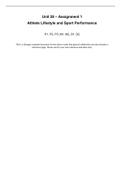Unit 28 – Assignment 1
Athlete Lifestyle and Sport Performance
P1, P2, P3, M1, M2, D1, D2
This is a 38-page complete document for the above marks that gained a distinction and also includes a
reference page. Please use for your own reference and ideas only.
,Introduction
Within this assignment I am the assistant education and welfare officer at my football
club and offer advice and support to footballers with the very specific challenges they
face in their lifestyles and behaviours and how this can affect their performance.
I have been asked to produce materials for sporting organisations that will help their
athletes have a healthy and rewarding experience within their sports, so will be covering
different lifestyle factors and behaviours and how these can affect athlete’s and their
performance and give examples to support my comments.
I will be advising on strategies that can be used by athletes to help deal with situations
which could influence their behaviour.
, Task 1
It is important that professional athletes represent their sport and clubs to promote a
positive image and maintain expected standards of behaviour, which is often higher
than amateur athletes or people in general. Professional athletes are constantly in the
public eye and inspire people, especially younger people, so need to be a positive role
model. Inappropriate lifestyles and behaviours (sporting and non-sporting) can not only
have a negative impact on performance and/or reputation but ruin their hard-earnt
career and damage the reputation of the club, the sport and sponsors.
Five different lifestyle factors that can affect athletes - P1, M1, D1
1. Leisure Time - Rest and Relaxation
Leisure can be defined as the time available to an athlete for rest, relaxation or a
pastime they enjoy. It can take a lot of stress away from the athlete because they are
constantly under pressure to perform to their maximum. If an athlete doesn’t get any
leisure time, then this can cause physical burnout and impact on their mental state,
causing them to perform poorly as have lack of focus and energy. Consequently, if any
athlete has too much leisure time, it could cause them to become lazy and
undisciplined.
Rest – It is important that athletes unwind from the physical and mental pressures of
their sport, giving a chance for their minds to switch off and bodies a chance to
recuperate in readiness for the next training session or competition. Sleep is the
recovery period as most sports that athletes take part in are physically demanding, often
with busy schedules in training, competitions and travelling do not allow an athlete to
get enough time for quality rest or a deeper sleep. Deep sleep is essential for muscle
recovery and restoring the body, as little brain activity, so the blood supply available to
muscles increases, delivering extra amounts of oxygen and nutrients which helps their
healing and growth. Muscles and tissues are rejuvenated during this phase of sleep (ref
1) which helps the athlete make a better physical recovery for their next performance
and helps with mental health which improves their concentration levels, decision making
and reaction times leading to improved performance or getting less injuries.





